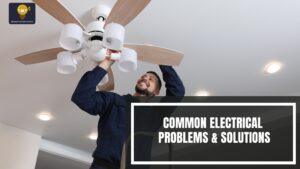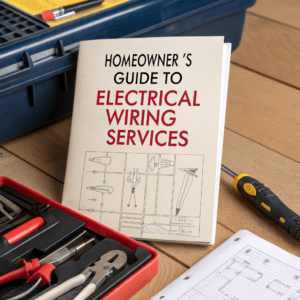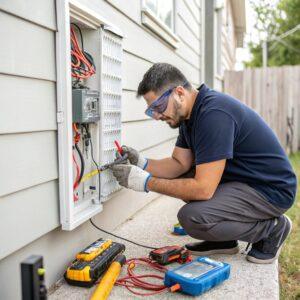Electrical Repairing Services: When to DIY and When to Call a Pro
When something goes wrong with your home’s electrical system, grabbing a screwdriver and trying to fix it yourself is tempting. After all, how hard could it be? A blown fuse here, a flickering light there—seems manageable, right?
But when it comes to electrical repairing services, knowing your limits is important. While some tasks are safe for homeowners, others can be risky. Faulty wiring or improper fixes can lead to fires, injuries, or expensive damage.
So how do you know when it’s okay to handle small electrical repairs on your own and when you should call a professional? Let’s break it down.
The Basics of Electrical Repairs
Electrical systems are vital to the function of a home or office. They supply power to everything from lights to appliances, and proper maintenance ensures these systems continue to work safely and efficiently. Many small electrical repairing services, like replacing a fuse or fixing a broken light switch, can be done by homeowners. However, when it comes to electrical wiring repairs or tasks that involve complex circuits, calling a professional electrical repairman is the safer choice.
What Are Some Common Electrical Problems?
Before deciding whether you should call an electrician, it’s important to know what kinds of issues you might encounter. Here are a few common electrical problems:
- Tripped circuit breakers: This happens when an electrical overload or short circuit trips the breaker, cutting off power.
- Flickering or dimming lights: This could indicate loose wiring or a problem with the power supply.
- Outlets that don’t work: A dead outlet may be a sign of faulty wiring, a blown fuse, or other electrical issues.
- Sparks or buzzing sounds: These could indicate a fire hazard and are a sign that something is wrong with your wiring or an appliance.
While these problems may seem simple, some can be more serious than they appear, requiring the expertise of a professional.
When Should You Attempt a DIY Electrical Repair?
Some electrical repairing services are relatively easy to handle, especially for those who have experience with basic electrical systems. Here are a few situations where you can consider DIY:
1. Replacing a Light Bulb or Lamp Socket
This is the most basic electrical task, and most people can do this safely without any prior knowledge of electrical systems. Simply make sure the power is turned off, and replace the bulb or socket.
2. Changing a Light Switch or Outlet
If a light switch or outlet isn’t working, you might be able to fix it on your own. Before attempting this, ensure the power is completely off at the breaker panel. If you’re comfortable working with wires and following safety procedures, you can replace the switch or outlet.
3. Resetting a Circuit Breaker
If your lights go out and the breaker trips, the first step is to check the breaker box. In most cases, resetting the breaker is all it takes to restore power. However, be cautious—if the breaker trips again, it could indicate an underlying problem that needs professional attention.
4. Replacing a Fuse
If a fuse blows, you can replace it by buying a new one of the same amperage. Just remember to turn off the power before opening the fuse box.
These repairs are relatively straightforward and don’t require a lot of tools or expertise. However, when it comes to more complex issues, it’s better to leave the work to a professional.
When Should You Call a Professional Electrical Repairman?
Certain electrical repairs require advanced knowledge of wiring, circuits, and safety protocols. In these cases, it’s always safer to hire a professional electrician. Here are some situations where DIY repair might not be a good idea:
1. Electrical Wiring Repairs
If you need to repair or replace wiring, it’s crucial to understand the layout and safety measures involved. Improper wiring can cause short circuits, fires, or electric shocks. An experienced electrical repairman has the expertise to handle these repairs safely and efficiently.
2. Electrical Overload Issues
When an electrical circuit is overloaded, it can trip breakers or even start fires. A professional can assess the load on your circuits and make the necessary adjustments. Overloading often occurs in older homes, where circuits might not be designed to handle modern electrical demands.
3. Frequent Tripping of Circuit Breakers
If your breakers frequently trip, it could indicate an underlying problem like faulty wiring or a malfunctioning appliance. While resetting the breaker might fix the issue temporarily, it’s important to have a professional inspect the system to identify the root cause.
4. Sparking or Buzzing Outlets
Sparking or buzzing sounds coming from electrical outlets are serious red flags. This usually indicates a problem with the electrical connections or wiring. A professional can quickly identify and fix the issue before it leads to a fire hazard.
5. Faulty Electrical Panel
If your electrical panel is outdated or malfunctioning, it could affect the entire electrical system in your home. An electrician can assess the condition of the panel and make necessary repairs or replacements to keep everything working safely.
DIY Electrical Repairs Vs Professional Electrical Repairing Services:
| Feature | DIY Electrical Repairs | Professional Electrical Repairing Services |
| Cost | Usually cheaper (no labor costs) | More expensive due to service and labor fees |
| Safety | Risk of shock, fire, or injury if done incorrectly | Safer—done by trained, licensed professionals |
| Complexity | Only suitable for simple repairs (e.g., changing outlets) | Handles complex issues like wiring, breaker panels, etc. |
| Tools Required | Basic tools (screwdriver, tester, pliers) | Uses professional-grade equipment and safety gear |
| Time Involved | May take longer if you’re unfamiliar with the task | Typically faster and more efficient |
| Code Compliance | May not meet local electrical codes | Ensures all work complies with current codes and standards |
| Risk of Mistakes | High for untrained individuals | Low due to training and experience |
| Warranty/Guarantee | None for self-repairs | Often includes service warranty or guarantee |
| Inspection & Diagnosis | Limited—based on what you can see or guess | Full inspection and diagnosis of hidden issues |
| Permit Requirements | May require a permit you’re unaware of | Electricians handle necessary permits and inspections |
| Suitable Tasks | Replacing light switches, installing fixtures, etc. | Wiring repairs, panel upgrades, circuit issues, etc. |
| Emergency Situations | Not safe or advisable | Trained to handle urgent electrical problems safely |
| Liability | You’re liable for damages or injuries | Covered by insurance and licensing |
| Long-term Reliability | Depends on your skill level | More reliable due to professional standards |
Why You Shouldn’t Ignore Electrical Maintenance
Regular electrical maintenance is essential to ensuring the longevity of your electrical system and preventing future problems. Scheduled inspections by experienced electrical repairers can detect issues early, saving you from costly repairs down the line. Routine maintenance includes:
- Checking the condition of wiring and outlets.
- Inspecting circuit breakers and electrical panels.
- Testing the functionality of smoke alarms and carbon monoxide detectors.
- Ensuring that electrical systems meet current safety codes.
Risks of DIY Electrical Repairs
While DIY repairs may seem appealing, they come with significant risks, particularly for those without formal electrical training. Even minor errors can result in hazardous circumstances. Some of the risks include
- Electrical shock: A high-voltage electrical shock can cause serious injury or even death.
- Fire hazards: Incorrect wiring or connections can cause overheating, leading to fires.
- Code violations: DIY repairs may not meet local electrical codes, resulting in fines or safety issues.
- Costly repairs: A DIY repair that goes wrong could end up costing more than if you’d hired a professional from the start.
How to Choose a Reliable Electrical Repair Service
When it comes time to hire an electrical repairman, it’s important to choose someone qualified and reliable. Here are a few tips for selecting the best electrical repairing services:
- Check credentials: Ensure the electrician is licensed and insured to protect yourself from liability in case something goes wrong.
- Ask for references: To evaluate the caliber of the electrician’s work, speak with prior clients or look through internet reviews.
- Get multiple quotes: Don’t settle for the first quote you receive. It’s always a good idea to compare prices from different repairers.
- Experience counts: Pick an electrician with prior experience performing the particular repair you require.
Conclusion
While it’s tempting to handle small electrical repairs yourself, certain tasks require the expertise of a professional. Knowing when to call an electrical repairman can help you avoid potential hazards and ensure that your electrical system stays in good working condition. Always prioritize safety, and don’t hesitate to reach out to a licensed electrician for more complex issues. After all, your safety is worth more than the cost of a professional repair.
Taking care of general electrical repairs is an essential part of maintaining your home or office. Whether you’re dealing with small electrical issues or larger, more dangerous problems, understanding when to DIY and when to call in the pros will keep you safe and help your electrical systems run smoothly.
Need reliable electrical repairing services? Contact NT Electrician today for fast, safe, and affordable solutions. Do not risk doing it yourself; instead, rely on the professionals to do it correctly!






